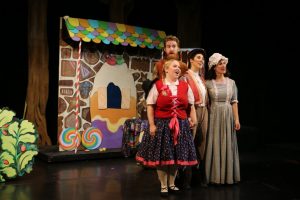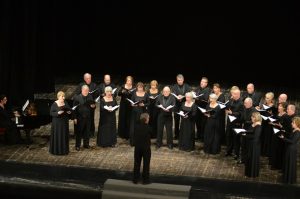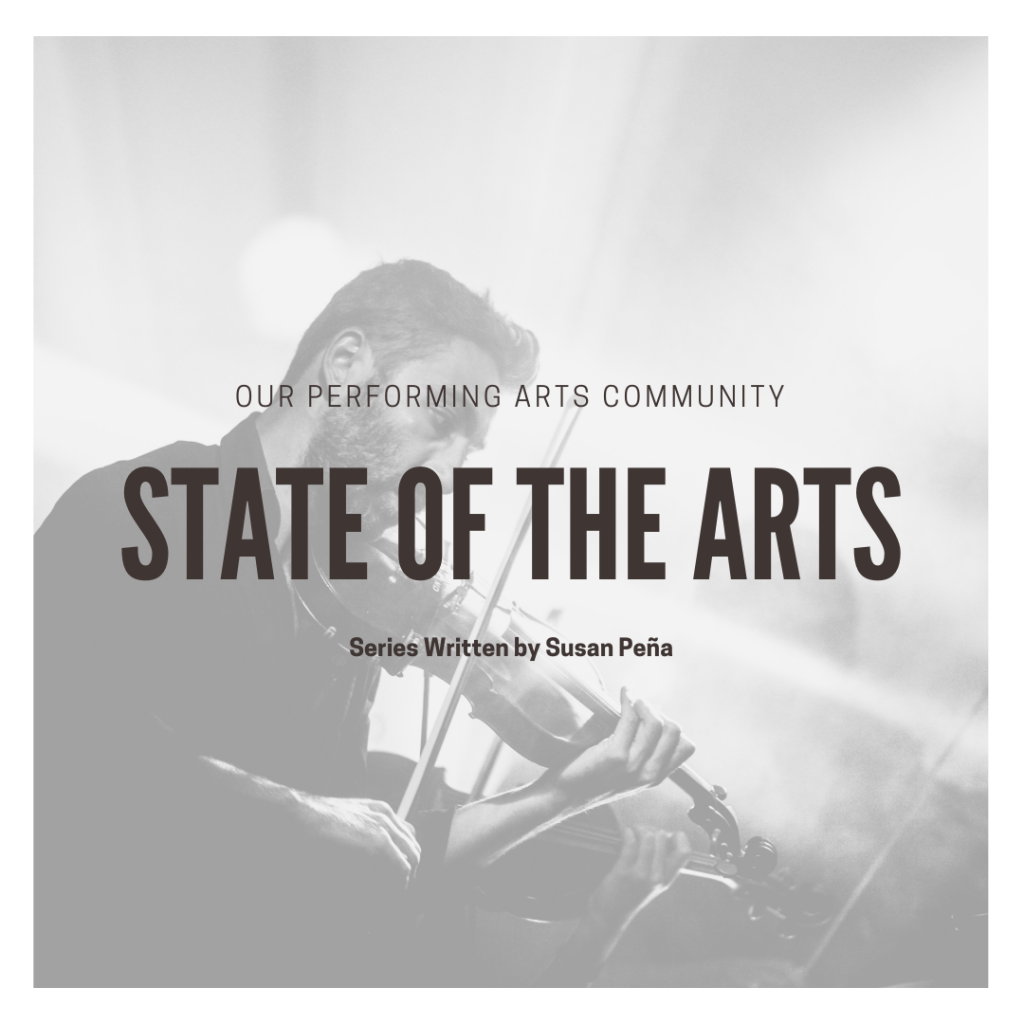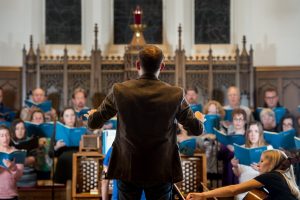Throughout the country, the performing arts have taken a huge hit as their venues have been closed down during the pandemic. This six-part series, inspired by the Reading Musical Foundation, will visit our own performing arts community—theaters, musical organizations, presenters, and educational/performing institutions—to see how they have been coping, and what their plans are for 2021 and beyond.
BCTV is collaborating with local journalists to bring you the stories of our community during the COVID-19 pandemic. This media partnership is made possible in part by the support of The Wyomissing Foundation.
It’s no secret that, throughout the world, the performing arts are facing an unprecedented challenge from Covid-19. In talking with representatives of our own local arts organizations—performing, presenting and educating—we have heard stories of frustration and loss, as venues have been forced to close and events (including vital fundraising gatherings) have been canceled.
Individual artists have struggled to make ends meet, as all their usual channels for income—performances, private teaching, masterclasses and workshops—have declined or disappeared altogether. One opera singer is selling homemade baked goods online; another is working a food truck. And even the old struggling actor’s standby, waiting tables, has vanished.
But balancing the sadness are stories of resilience, creativity and determination. Performing artists—ever resourceful from having to exist, even in the best of times, on limited budgets—have quickly learned to use technology that didn’t exist just a few years ago to keep reaching their audiences and stay active in their crafts.
As in most places, smaller performing groups have the advantage of lower overhead and more flexibility, especially those relying mostly on volunteers. Larger organizations like symphony orchestras, with paid staffs, offices and contracted professional musicians, have the biggest challenges.
Two messages emerge from the many interviews we’ve conducted:
First, if there was ever a time to support the arts with financial donations, that time is now. We encourage readers to check out the online performances, and remember to include your favorite organizations in your charitable giving. Every bit helps.
Second, all the performing artists are yearning to have the connection to each other and with their audiences that is only possible through live performance. Even the most sophisticated technology can’t replicate the spontaneity and emotional impact of this communal experience.
In the first story of this six-part series, we are looking at how groups that provide essential opportunities for our local and regional musicians to perform are coping with the pandemic, and how they’re planning for this year and beyond.
We are featuring the Reading Choral Society, Opus One Chamber Choir, Vox Philia, Berks Sinfonietta, the Wheatland Chorale and Berks Opera Company. (The Reading Symphony Orchestra will be featured in the next story.)
Reading Choral Society
While RCS, founded in 1875, is one of the oldest choral ensembles in the United States, they have quickly come up to speed on technology, thanks to their music director, Graham Bier, who has led them in virtual rehearsals and performances throughout 2020, including December’s excerpts from Handel’s “Messiah.” (These are all still available on YouTube.)
Bier said the group’s first foray into virtual choir territory was during last summer, when composer John Conahan conducted a workshop that included an original piece, “Dreams and Dreams,” written for RCS. Conahan himself directed the piece, and after that Bier learned how to use the technology on his own, through online tutorials and with experienced friends walking him through the process.
“My interest in it is as a separate art form,” he said.
The process is painstaking, to say the least. Section leaders first record the soprano, alto, tenor and bass parts, following Bier’s instructions on tempo and dynamics. These recordings are sent to members to give them something to sing along to; they, in turn, record themselves singing their part on a separate track.
Bier, using special software, then has the job of putting together all these tracks, adjusting them by ear until they are all in sync. For one piece, this can involve 60 videos plus another for instrumental accompaniment.
“The biggest challenge,” Bier said, “is that the ‘flocking’ effect we rely on in choral music is gone in a virtual project. Few people in Reading Choral Society would ever sign up for a solo. I make the decisions about dynamics and phrasing, but each singer is essentially doing it alone.”
Thanks to RCS’s “strong, creative board,” Bier said, the group has taken on the challenge of continuing to perform, even with a downsized budget due to lack of ticket sales. They have managed to retain about 70 singers (about 25 have taken a break for the year), and have kept Bier, the section leaders and accompanist employed.
On Nov. 4, they premiered their first full virtual concert, “Lost in London,” a lighthearted time-travel piece featuring Renaissance madrigals and lute songs. Bier divided the RCS into five chamber ensembles; some were individually recorded at home, and others in person with social distancing and masks. So far they have had 800 views.
At the time of this interview, RCS was preparing excerpts from Handel’s “Messiah,” with solos, an orchestral interlude, and the “Hallelujah Chorus” recorded outside in-person.
Bier said he feels proud of how the singers have stepped up to the challenges, and “how we have offered our singers multiple options”: live rehearsals with masks, zoom rehearsals, virtual performances, filmed live performances.
As for 2021, he has designed a season with built-in flexibility.
On January 16 at 1 p.m., the RCS annual Winter Sing in honor of Dr. Martin Luther King will be held via Zoom, with guest director Jillian Harrison-Jones. This is free of charge, but registration is required.
The March concert was planned as a walk through the Reading Public Museum; this can be virtual or live. The same is true for the May concert, which will feature Vivaldi’s “Gloria.”
RCS has been supported with a special grant from the Berks County Arts Fund of the Berks County Community Foundation specifically for continuity through Covid-19, and from the Reading Musical Foundation.
To keep up with the plans or make a donation, visit www.readingchoral.org. To watch “Lost in London” and other concerts, visit https://www.youtube.com/watch?v=NO28ewBg058&t=134s.
Opus One Chamber Choir
Christopher Hoster, Opus One’s founder and director, said “it threw us for a loop last year” when the pandemic forced him to cancel the big Broadway concert they had planned for June at the DoubleTree by Hilton Hotel Reading.
Immediately, supported by the Opus One board, he pivoted to a virtual season, which has included a series of master classes, offered free of charge to donors of $50 or more and Opus One members, and available to the public for a fee. The virtual concert, “Lessons and Carols,” including readings by community members, was a ticketed event available online from Dec. 13 to 27.
Like RCS’s “Lost in London,” “Lessons and Carols” was a mix of filmed live performances, including a four-hand piano version of Ralph Vaughan Williams’ “Fantasia on Greensleeves,” a flute/organ solo, virtual choirs of various sizes, and recorded readings of Biblical scripture and secular poetry by representatives of local churches and nonprofits.
Hoster relies on the help of Alan Sylvestre for the technical aspects of putting together the virtual finished product. He and associate director Diana Cook review all the individual recordings to make sure they are correct before handing them over for editing and synchronizing.
“It’s so difficult to put all the elements together, and there’s no substitute for live music,” he said. “But (the virtual concert) was surprisingly good.”
Hoster said Opus One is already planning another virtual season for 2021, continuing with seminars and masterclasses. “Modern Salon No. 2,” a virtual recital of solos and duets, is set for March 7 through 13, and Hoster is working on the next full-length virtual concert, “Music of America,” for June 6 through 13. His source material will include songs from a 1698 Bay Psalm Book, the Sacred Harp and Moravian traditions, and African-American spirituals (including those from the earliest collection from 1867), as well as patriotic songs.
Opus One has been supported by donations, grants from the RMF, Berks Arts Council and BCCF, and by ticket sales.
For information on upcoming concerts and online classes, and to donate, visit www.OpusOneChamberChoir.com.

Vox Philia and Berks Sinfonietta
Although these are separate groups, the first a chamber choir and the other an orchestra, they share one music director, David McConnell, who founded both (in 2013 and 2014), and have collaborated for some concerts.
“When (the shut-downs) first happened, my first thought was that so many of the (professional instrumentalists) playing with us were losing so much work,” McConnell said. “We raised enough money to pay them for the June concert that was canceled. Then we had the idea to pre-record some concerts for the Sinfonietta, which gave them some work, at least.”
Since Immanuel UCC in Shillington—where McConnell had served as music director until last year—already had high-quality video equipment used for livestream worship, he obtained permission to record chamber concerts using strings only, so masks and social-distancing protocols could be followed.
So far, the Sinfonietta has livestreamed four concerts in August, September, October and November, which are still available to watch on YouTube. All of them featured works by African-American and women composers, which is part of McConnell’s mission in programming. In December, they produced a holiday concert, “What Sweeter Music,” with Vox Philia using Zoom technology.
While McConnell found the instrumentalists were “happy to be making music together again,” the virtual process was much less enjoyable for the singers.
“Even the finest singers find the process of recording themselves is like standing naked before a mirror and seeing every flaw magnified,” he said. “They feel very exposed and vulnerable, and that takes the joy away from it. Some of them can do it with someone in their bubble. But they have to push past the discomfort.”
For 2021, Berks Sinfonietta will continue to present monthly virtual concerts, at least through March.
“We’re trying to organize concerts outside for June through August,” McConnell said. “Then perhaps by November, if the distribution of the vaccine goes well, we can resume live concerts indoors.”
As for Vox Philia, he said, plans are being made to use archives of past concerts and create virtual videos until it’s safe to sing together again.
“People have been extremely supportive and generous,” McConnell said. In addition to grants for both groups from the Berks Arts Council and the Reading Musical Foundation, the public has stepped up with donations online and through Giving Tuesday, which raised about $4,000 to support the musicians.
For more information on upcoming concerts and to donate, visit www.berkssinfonietta.org and www.voxphilia.org. To view online concerts, visit https://www.youtube.com/watch?v=u2uusx51vk4&t=1491s.

Berks Opera Company
Since its first productions performed in the Peanut Bar in Reading and Godfrey Daniels in Bethlehem in 2007, BOC has established a reputation as an innovative, “guerrilla” company. Always on a shoestring budget, founders Francine and Tamara Black have managed to bring high quality to all their productions, which feature opera singers with international careers alongside talented regional and local vocalists and instrumentalists.
But Covid-19 has hit opera companies especially hard. Even the Metropolitan Opera is struggling to survive, and opera singers—like athletes and dancers—tend to have relatively short performing careers. Having to put such a career on hold for a year or two is disastrous.
“This is so challenging,” said Tamara Black, now BOC’s artistic director, who has starred in many past productions and is a voice professor at Albright College. “Some singers—about 30 to 40 percent—are getting out of the business, particularly in the regional levels. They’re getting jobs in stores, the Post Office, and so on, for the health insurance. . .
“In general, people are more focused on the outdoors, hiking and biking, and healthy eating; they’re not traveling as much, so they’re sleeping more. But the flip side of that is that there are significant mental health problems.
“Singers’ voices are part of their bodies; their identities are wrapped up in what they do.”
Black said that last spring they had to cancel all their planned performances, including the smaller events they have been holding at Judy’s on Cherry in Reading, and any staged or concert-style operas. Over the summer, they have produced a “mini opera festival” online, sharing arias recorded by artists they have used in past productions on Facebook.
BOC board president David Richie, who has given presentations, “Unleashing Your Inner Opera Fan,” prior to each of the BOC operas, and before the live Met Broadcasts shown in local movie theaters, has recorded several new ones, streamed on BCTV and on BOC’s website.
This year, BOC is planning to continue such activities until restrictions are lifted on indoor gatherings. They are in the initial stages of preparing for an outdoor production of Engelbert Humperdinck’s opera “Hansel and Gretel” during the summer.
What is most exciting for Black is that BOC is commissioning two one-act operas to be performed together from composer Chris Heslop. They will be based on Berks County folklore, and performed with a chamber ensemble, possibly in the spring of 2022. The RMF has provided a grant to workshop the production.
“We want to bring people together and foster a sense of community as we come out of this difficult time,” Black said.
For more information on BOC, visit www.berksopera.org. You can view their video productions on Facebook, YouTube and BCTV.

Wheatland Chorale
Although their home is in Lancaster, the Wheatland Chorale is included in this article because it includes singers from Berks County and has performed twice a year at Atonement Lutheran Church in Wyomissing for nearly all of its 33 years.
The Wheatland’s director, Eric Riley, who took over as artistic director from founder Robert J. Upton in 2012, said the chorale has suspended all its musical activities since March 2020, although its board has been meeting regularly on Zoom.
“We had our last rehearsal at Lancaster Church of the Brethren,” Riley said. “It was a wonderful rehearsal, in a warm acoustic environment, a really nice musical experience.”
The concert they were rehearsing, “Charity and Love,” would have been performed the last weekend in April. He said they’re hoping to perform it as their first event when the pandemic is over, as a balm for what has been such a difficult time for everyone.
Riley, who has been a church musician since the age of 9, is currently the artist in residence at St. Matthew Evangelical Lutheran Church in York, which livestreams its services. He has also performed as a concert organist in Europe for many years, including 16 times in Italy; this year those activities were suspended.
“We haven’t done Zoom rehearsals or virtual performances,” he said. “It’s my fault—I have no interest in doing that. The singers have no control over volume, and treating singers like tone generators doesn’t appeal to me.
“But some of our singers are doing it with other choirs, and are having wonderful experiences.
“We’re missing each other and missing making music together. But we have an advantage because we’re so small, all the singers are volunteers, and we have no office, so we can shut down without being hit financially. I have scores in hand, and we can be ready to go as soon as we get the green light.”
For information on the Wheatland Chorale, or to make a donation or purchase one of their CDs, visit www.wheatlandchorale.org.





